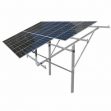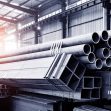Why to use galvanized steel pipe for oil and gas pipeline?
Why to use galvanized steel pipe for oil and gas pipeline?
According to some records, by the late 1960s, with the further requirements of pipeline construction, steel pipe manufacturers began to form the pipe using a high frequency electric resistance weld, increasing the reliability of the longitudinal seam. Meanwhile, some steel pipe manufacturers universally applied improved coatings to new pipe, another advance in corrosion control. By the late 1990s, anti-corrosion coatings had improved further, and are tested before being placed in service to ensure that they have not been damaged during transport and construction. Pipelines are now installed with deeper cover, and bored crossings under highways and rivers provide greater protection and less potential for damage during installation.
The main points concerning the durability of galvanized steel pipe as it affects pipeline safety are as follows. Firstly, the steel itself does not degrade with the passage of time. Eighty-year-old pipe, if it is properly protected, exhibits the same properties if tested today as it would have if tested 80 years age. Secondly, while the lower initial performance characteristics of older materials and their possible exposure to in-service degradation (before cathodic protection, for instance) is a concern, current inspections and/or testing of pipelines comprised of older materials are used to detect potential problems before failure. Thirdly, the continued satisfactory performance of any pipeline, old or new, requires levels of inspection and maintenance appropriate to the performance characteristics of the materials and the severity of degrading factors to which the pipeline has been exposed in its operating environment. Finally, new technology can identify and characterize ever-smaller defects, thus improving performance further.
Cold rolled steel pipe generally has the rational cost effective in the current steel pipe market. Compared with other typical steel pipe coatings, such as specialized painting and powder coating, galvanization is much more labor-intensive, resulting in a higher initial cost for contractors. Besides, due to its durability and anti-corrosive properties, galvanized steel pipe can recycled and reused, which to some degree save a lot of money during the post maintenance work. Testing and studies have revealed that the average life expectancy for galvanized steel used as a typical structure material is well beyond 50 years in a rural environment and 20-25 years or more in an extreme urban or coastal setting. In that regard, contractors can confidently use this product in project. Today, pre galvanized steel pipe is one important type of product widely used in every part of the oil and gas industry from production and processing to the distribution of refined products. And the galvanization process protects the steel from rusting damage that can occur during transportation, installation and service. The zinc layer on the surface of pipe can form a barrier protection for steel products to extend the service life in applications. Carbon steel pipe is the popular type of pipe used for pipelines especially the ones at high pressures. Carbon steel pipeline, operating underground, face corrosion problems and need corrosion protection systems such as coatings. Besides, these pipelines also need internal coatings for corrosion protection and also to improve flow efficiency.
Tel: +86 18202256900 Email: steel@tjdpbd.com










